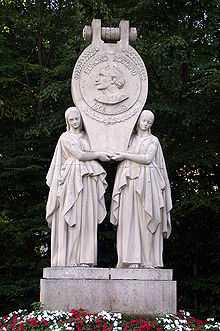Edmond Rostand
| Edmond Rostand | |
|---|---|
 Rostand in the uniform of the Académie française, 1904 | |
| Born |
Edmond Eugène Alexis Rostand 1 April 1868 Marseille, France |
| Died |
2 December 1918 (aged 50) Paris, France |
| Occupation | Poet, playwright |
| Nationality | French |
| Spouse | Rosemonde Gérard |
| Child(ren) |
Jean Rostand Maurice Rostand |
| Information | |
| Magnum opus |
Cyrano de Bergerac L'Aiglon |

Edmond Eugène Alexis Rostand (French: [ʁɔstɑ̃]; 1 April 1868 – 2 December 1918) was a French poet and dramatist. He is associated with neo-romanticism, and is best known for his play Cyrano de Bergerac. Rostand's romantic plays contrasted with the naturalistic theatre popular during the late nineteenth century. Another of Rostand's works, Les Romanesques, was adapted to the musical comedy, The Fantasticks.
Early life
Rostand was born in Marseille, France, into a wealthy and cultured Provençal family. His father was an economist and a poet, a member of the Marseille Academy and the Institut de France. Rostand studied literature, history, and philosophy at the Collège Stanislas in Paris, France.
Career
His first play, a burlesque, Les romanesques was produced on 21 May 1894 at the Théâtre Français; it would be adapted in 1960 by Tom Jones and Harvey Schmidt into the long-running American musical The Fantasticks. Another early play, La Princesse Lointaine, was based on the story of the troubadour Rudel and the Lady of Tripoli. This play opened on 5 April 1895 at the Théâtre de la Renaissance. The part of Melissande was created by Sarah Bernhardt, who also was the original Photine of Rostand's La Samaritaine (Theatre de la Renaissance, 14 April 1897), a Biblical drama in three scenes taken from the gospel story of the woman of Samaria.

In L'Aiglon he chose a subject from Napoleonic history, suggested probably by Henri Welschinger's Roi de Rome, 1811–32 (1897), which contained much new information about the unhappy life of the Duke of Reichstadt, son of Napoleon I, and Marie Louise, under the surveillance of Metternich at the Schönbrunn Palace. L'Aiglon in six acts and in verse, was produced (15 March 1900) by Sarah Bernhardt at her own theatre, she herself undertaking the part of the Duke of Reichstadt.
In 1901, Rostand became the youngest writer to be elected to the Académie française. Chantecler, produced in February 1910, was awaited with an interest, enhanced by considerable delay in the production, hardly equaled by the enthusiasm of its reception. Lucien Guitry was in the title role and Mme. Simone played the part of the pheasant, the play being a fantasy of bird and animal life, and the characters denizens of the farmyard and the woods.
Personal life
Rostand was married to the poet and playwright Rosemonde Etienette Gerard who, in 1890, published Les Pipeaux: a volume of verse crowned by the Academy. The couple had two sons, Jean and Maurice.
In the 1900s, Rostand came to live in the Villa Arnaga in Cambo-les-Bains in the French Basque Country looking for a cure for his pleurisy. The house is now a heritage site and a museum of Rostand's life and Basque architecture and crafts. Rostand died in 1918, a victim of the flu pandemic, and is buried in the Cimetière de Marseille.
Works
- Le Gant Rouge, 1888 (The Red Glove)
- Les Musardises, 1890
- Les Deux Pierrots, Ou Le Souper Blanc (The Two Pierrots, or The White Supper), 1891
- Les Romanesques, 1894 (basis for the 1960 off-Broadway musical The Fantasticks)
- La Princesse Lointaine (The Princess Far-Away), 1895
- La Samaritaine (The Woman of Samaria), 1897
- Cyrano de Bergerac, 1897
- L'Aiglon: A Play in Six Acts. 1900
- Chantecler: A Play in Four Acts, 1910
- La Derniere Nuit de Don Juan (The Last Night of Don Juan, in Poetic Drama), 1921
- Le Cantique de L'Aile, 1922
- Le Vol de la Marseillaise, 1922
References
- Edmond Rostand: Cyrano de Bergerac, Nick Hern Books, London, 1991. ISBN 978-1-85459-117-3
- Henry James in vol. 84, pp. 477 seq. The Cornhill Magazine.
- Marcel Migeo: Les Rostand, Paris, Stock, 1973. About Edmond, his wife Rosemonde, and their sons Jean and Maurice Rostand.
-
 This article incorporates text from a publication now in the public domain: Chisholm, Hugh, ed. (1911). Encyclopædia Britannica (11th ed.). Cambridge University Press
This article incorporates text from a publication now in the public domain: Chisholm, Hugh, ed. (1911). Encyclopædia Britannica (11th ed.). Cambridge University Press
External links
| Wikimedia Commons has media related to Edmond Rostand. |
| Wikiquote has a collection of quotations related to: Edmond Rostand |
- Brief biography of Rostand at Kirjasto (Pegasos)
- French text of Rostand's La princesse lointaine
- Works by Edmond Rostand at Project Gutenberg
| |||||
| |||||||||||||||||||||||||
|